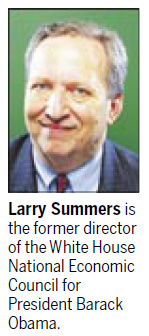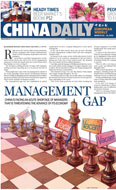Foreign and Military Affairs
China's growth isn't a threat: Summers
Updated: 2011-03-24 15:17
By Chen Weihua (China Daily)
NEW YORK - Larry Summers, the former director of the White House National Economic Council for President Barack Obama, cautioned against protectionism and said nations must move "past the idea that the prosperity of one country is a threat to the prosperity of others".
He pointed out that Asia's growth can be a great opportunity for an American economic revival.

"It is true that a major threat to Pepsi's superiority, in Pepsi's position, is the success of the Coca-Cola company. It is true that a threat to American automobile industry has been the success of the Japanese automobile industry. It is not true that the prosperity and growth of one country has a major deleterious effect on growth of another," Summers said at an Asia Society meeting in New York on Wednesday.
He compared the emerging markets of Asia as customers of American products as well as suppliers for American producers.
"When your customers get richer, your opportunities improve. When your suppliers become more cost efficient and are able to produce high quality goods, your prosperity improves," said Summers, who was also the former secretary of the treasury under the Clinton administration and a former chief economist at the World Bank.
While acknowledging that some companies within emerging markets will compete with companies in the US, he said "that is only one of the many interactions that are relevant".
"Think of the rise of Europe. Would anyone seriously suggest that the successful reconstruction of Europe after the World War II impoverished the United States? Is it reasonable to assume that the rise of the South within the US made the area where I live, the northeast New England, poor?
"We need to move past the idea that the prosperity of one country is a threat to the prosperity of others. That is the seductive and potentially misleading aspect of the word 'competitiveness'."
Kathleen Stephansen, managing director and head of economic strategy of AIG Asset Management, also cautioned against protectionist sentiments, but she believes the Chinese currency issue has been blown out of proportion.
"When you look at the (Chinese currency) impact on the growth of US exports, it's very small. It might have (had a) negative effect, but on the other hand it has a positive impact in providing cheap credit," she said.
Summers marveled at the rapid growth of Asia, in particular China, where living standards have doubled in eight or nine years. He said that it took a generation in the US for that to happen around the turn of the 20th century when the US economy grew rapidly.
He suggested that if history of this era is written 200 years from now, the end of the Cold War will be a subplot. The most important story will be how this enormous forward thrust in Asia ends up.
The relatively benign storyline, Summers said, will be for nations to come together, compete and cooperate to produce greater prosperity and security for all citizens while respecting environmental imperatives.
He advised that countries should work to maximize the likelihood of that favorable outcome. He also hoped that the rapid growth of Asia would help spur a renewal in the US, similar to the impact that the German and Japanese economic success had on the US economy in the 1990s.
Top on the US agenda should be addressing debts, the profound federal deficit, the infrastructure deficits and a deficit in the creation of human capital, such as in the education system.
"If we are able to do this, I believe we can redeem the promise of this moment. I believe a stronger and vital United States can make an important contribution in the future as in the past to a healthy global economy," he said.
Summers said that if the US maintains an outward looking spirit, it will likely become a more resilient place to respond to all kinds of unexpected shocks that are certain to come.
Bill Rhodes, president and CEO of William R. Rhodes Global Advisors, LLC, suggests that the key to fight protectionism is to sustain growth. "If you sustain growth, you bring down barriers. Otherwise you see protectionism and other mentality."
The comments by the economists echo criticism of the Obama government for adopting protectionist measures and are a reflection of current public sentiment in the US.
A Pew Center poll early this year shows that a 60-percent majority of Americans see China's economic strength as a greater threat than its military strength. And a 53-percent majority says it is very important for the US to get tougher with China on trade and economic issues.
At the same time, 58 percent majority say it is very important to build a stronger relationship with China.
E-paper

Rise and shine
The Chinese solar energy industry is heating up following recent setbacks in the nuclear sector
Bombs aim for regime change
CSI, with a twist
Literary path
Specials

Peony express
Growers of china's unofficial national flower are reaching out to europe for help

Tea-ing up
More turning to Chinese tea for investment opportunities like vintage wine

A cut above
The ancient city of Luoyang is home to a treasure trove of cultural wonders.
